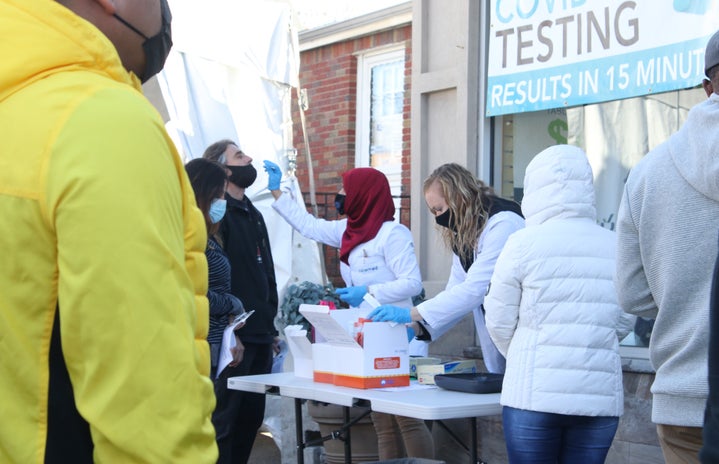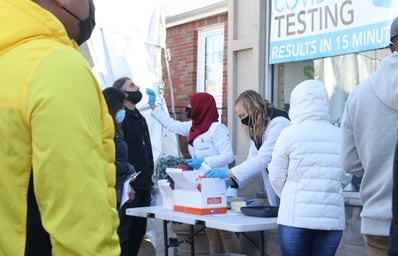With an end to the pandemic on the horizon — made possible by a constant distribution of vaccines — a lot of us have had questions about, well, literally everything related to the vaccine. From basics like when we all gain access to vaccines to more complicated specifics like how it’s actually developed, we sat down with Dr. Purvi Parikh, an investigator for the COVID-19 vaccine at the NYU Vaccine Center and an allergist and immunologist with the Allergy & Asthma Network, to get the details.
Her Campus (HC): When are we expected to have herd immunity?
Dr. Parikh (DP): It all depends on how soon we can get everyone vaccinated. It’s estimated that 70-80% of the population needs to be vaccinated, so we’re hoping before the end of 2021 we can reach herd immunity. By then, it will be approved for children and hopefully, more people will be vaccinated. We’re doing well, but the effort could be sped up a little bit. Right now, we’re still under about 20% of the general population.
HC: When will we all have access to the vaccine?
DP: A lot of states are already approved to administer to those aged 16 and up. So, for example, Arizona is already vaccinating 16 and up; so is Alaska. New York is going to be [vaccinating 16+] in the next two weeks actually. They are starting 30 and up soon and 16 and up will be shortly thereafter. A lot of places already are, and if you’re someone who works or volunteers at a healthcare center, you are eligible. It shouldn’t be too far away. It depends where you live and what you do.
HC: How can companies create a vaccine for this so quickly, but not other diseases like AIDS or Cancer?
DP: Well, the thing is it’s not as fast as everybody thinks it is. This vaccine technology is based on 30+ years of research, specifically mRNA vaccines. Even with the Johnson & Johnson vaccine [the technology] has been studied even longer than that, so a lot of the work was already done. That was kind of good luck. But also, a lot of it is driven by money.
This is the first time in history where the entire world, the scientific community and pharmaceuticals are putting money into one common goal — this vaccine. For HIV and other viruses, we could have a vaccine or something faster. I just think that the resources aren’t there, and the urgency [hasn’t been] there.
The safety and efficacy concerns haven’t been compromised. No corners have been cut, and it will be continued to be followed for years to come.
HC: Pfizer once had one of the biggest lawsuits in the USA for faking trial data, why should their vaccines be trusted?
DP: I wouldn’t worry about that because Pfizer and all of the other companies are held accountable by a lot of independent safety and monitoring boards. For example, last week, AstraZeneca had released data and then the NIH (National Institute of Health) said, ‘Your data is too old and you’re making key cases,’ forcing them to re-process their data. In the same way, Pfizer is also held accountable by independent boards of physicians and scientists, so they wouldn’t be able to get away with faking data — especially during a pandemic, when there’s even more scrutiny and attention on everything.
It’s also good that we have multiple options. If there was only one company driving all of this, then there would be less accountability. Because there are more companies and we have these safety checks to monitor them, I wouldn’t really worry about that. Plus, they’re being held accountable by their competitors, too.

HC: How long is the vaccine expected to last? Will we have to get more than the initial dosages?
DP: Hopefully, it will last a while. Most of these studies are less than a year old. We don’t have that long term data yet. What Pfizer announced recently says that the vaccine will definitely last six months, but I have a feeling that it will be a year or more. It will probably be similar for the other companies, too.
The short answer is we don’t know until we, well, know; that time has to go by and we have to continue to monitor these patients to make sure their immunity is holding strong overtime. I am hoping that it’s at least a year or more so we don’t have to take it as frequently. But there are so many variables like these new variants that may affect how long immunity lasts, too.
HC: How do these vaccines hold up against the new COVID variants popping up?
DP: Currently, they’re all holding up very well against the UK variant. Even with the South African variant, it does show that all of the vaccines are effective, but some of the vaccines may be a little less effective with that variant. That’s why it’s important that more people get vaccinated because the sooner people get vaccinated, then it’s less likely that more variants will emerge that are resistant [to the vaccine].
Right now, we’re in pretty good shape. Pfizer also announced recently that they are showing good efficacy with both the UK and South African variants, so that’s good news. Again, all of this can change the longer it takes us to reach herd immunity, and that’s why mask wearing, social distancing and getting your vaccine is so important.
It’s important to do your own research – rather than just listening to Facebook comments or word of mouth – to make an informed decision as more and more vaccination appointments become available to the general public. Our audience had a lot of questions about the COVID vaccines, and asking was the first step to becoming informed!



